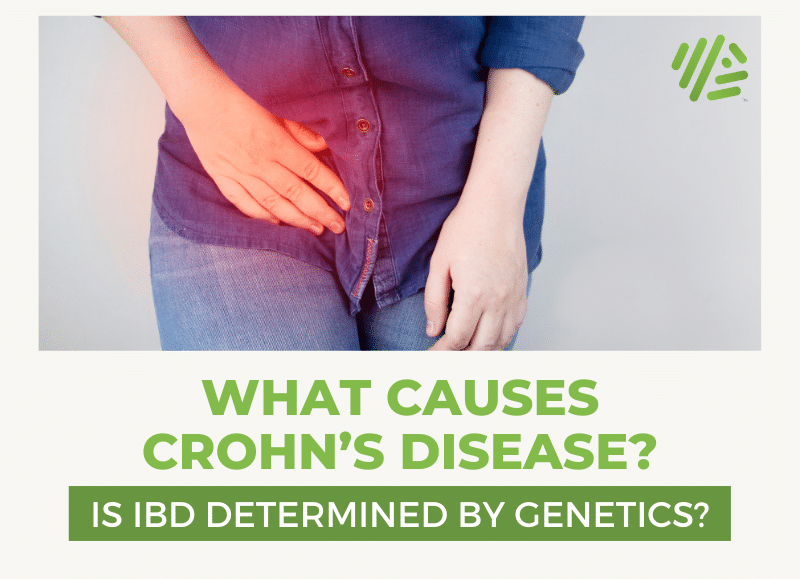What Causes Crohn’s Disease? Is IBD Determined by Genetics?
Genes Mentioned

Contents
What is Crohn’s disease?
Crohn’s disease is a form of inflammatory bowel disease (IBD) and is characterized by an abnormal immune system response that leads to excessive inflammation in the digestive tract. Typically, this occurs in the intestinal walls, especially in the ileum (the lower part of the small intestine), but it can also affect tissue anywhere from the mouth to the anus. Ulcerative colitis is another form of IBD, but, unlike in Crohn’s disease, ulcerative colitis is typically isolated to the colon. Crohn’s disease can arise at any age, but usually appears when a person is an older teenager or in their 20s. 2 And, because inflammation waxes and wanes according to a whole heap of factors, symptoms of Crohn’s disease tend to flare up throughout life, and especially at times of stress. 3 As tissues become inflamed and ulcers develop in the digestive tract, symptoms such as abdominal pain, cramping, weight loss, fever, loss of appetite, and persistent diarrhea can occur. Bleeding may also lead to discolored stools and anemia, if blood loss is persistent and/or severe. Some people with Crohn’s disease also experience symptoms related to inflammation in other parts of the body, such as in the joints, skin, and eyes. Scar tissue and inflammation can also cause intestinal blockages, and ulceration can lead to the development of fistulae, bridge-like connections between areas of tissue such as the intestine, skin, bladder, or vagina.Crohn’s disease and genetics
If you have Crohn’s disease, chances are that it also affects other people in your family. About 15% of people with Crohn’s disease have a parent or sibling who also has Crohn’s. And, as mentioned, if you have an identical twin with the disease, you have a 58.3% chance of also having Crohn’s disease. 1 At least 200 genetic variations have been identified that affect your risk of developing Crohn’s disease. These appear to modulate risk via the immune system, and through changes to the microbiome. Some of the genes identified so far that have been associated with an increased risk of developing Crohn’s disease include: Around 30-50% of people in the western hemisphere carry a disease-causing mutation in at least one allele of NOD2, and people who have two mutated alleles have a 20- to 40-fold increased risk of developing Crohn’s disease. 4 5 Data from 51 studies involving over 28,000 people, including more than 12,000 with Crohn’s disease, revealed that people with the ATG16L1 variant rs2241880 had a 38% increased risk of Crohn’s disease. The ATG16L1 mutation also has been associated with an increased risk of necrotizing enterocolitis in premature infants. 6 In contrast, people with the IL23R variant rs11209026 were 54% less likely to develop Crohn’s disease. 7Crohn’s disease and other health issues
Considering just how many genes are involved in Crohn’s disease, it’s understandable that there is some overlap with other health issues. A genetic link has been found between Crohn’s disease and diabetes, as well as rheumatoid arthritis and psoriasis. Crohn’s disease also seems to be linked to Ankylosing Spondylitis, with the two disorders sharing at least seven genes, four of which involve immune function. 8Risk factors for Crohn’s disease
Lifestyle, diet, environment, and genetics seem to be co-conspirators when it comes to Crohn’s disease.Smoking
Smoking, for instance, doubles the likelihood of developing Crohn’s and increases the frequency and severity of flare-ups. 9Urban living
People who live in urban areas have also been found to be 42% more likely to have Crohn’s disease, which suggests that factors such as pollution, sedentary lifestyles, and diet might play a role in the disease. 10High animal fat and high sugar diets
Indeed, diets high in animal fat and low in fruits and vegetables are most strongly associated with an increased risk of IBD. 11 It makes sense that a diet high in sugars and saturated fats (especially pro-inflammatory animal fats) and lacking in antioxidants and other vital nutrients, could contribute to Crohn’s disease by promoting intestinal inflammation, altering the gut microbiome, and impairing healing and immune function. 11 Fiber is a contentious issue for people with IBD, given that some types of fiber can exacerbate symptoms while others may help reduce inflammation. Diets high in soluble fiber, for instance, can help lessen inflammation because they increase production of the anti-inflammatory short-chain fatty acid butyrate in the intestine. 11 Diets high in FODMAPs may, however, exacerbate symptoms in some people, with a low-fiber diet often advised during flares of IBD.FODMAPS
FODMAPs (Fermentable Oligosaccharides, Disaccharides, Monosaccharides and Polyols) are types of fiber that are poorly absorbed in the gut, which can lead to excess gas production, bloating, abdominal pains, cramps, diarrhea, and constipation. Many people with Crohn’s disease, as well as irritable bowel syndrome, have success with a low-FODMAP diet, although this should be done under the guidance of a qualified nutritionist as cutting out a wide range of foods puts you at risk of nutrient deficiencies.Addressing nutrient deficiencies caused by Crohn’s
Crohn’s disease itself presents an increased risk of nutrient deficiencies, likely through malabsorption and increased demand for certain nutrients to facilitate healing. Nutrients that are particularly problematic include:- iron,
- calcium,
- zinc,
- magnesium,
- vitamin D,
- vitamin B12,
- folic acid,
- and vitamin A. 12




Hello!
Your article about “The genetics of Crohn’s disease: what you need to know”, don´t refer the fact that diet removing gluten and dairy, can revert the symptoms. It´s a important information!
In my personal case, I´m revert the symptoms, and I’m now consider free of Crohn, with the change of diet, removing gluten and dairy!
Manage stress its important too!
Thanks for the great information in the site!